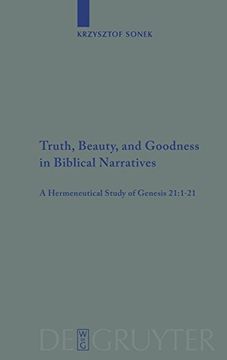Compartir
Truth, Beauty, and Goodness in Biblical Narratives (Beihefte zur Zeitschrift fur die Alttestamentliche Wissenschaft) (en Inglés)
Krzysztof Sonek (Autor)
·
Walter De Gruyter Inc
· Tapa Dura
Truth, Beauty, and Goodness in Biblical Narratives (Beihefte zur Zeitschrift fur die Alttestamentliche Wissenschaft) (en Inglés) - Krzysztof Sonek
$ 300.100
$ 600.200
Ahorras: $ 300.100
Elige la lista en la que quieres agregar tu producto o crea una nueva lista
✓ Producto agregado correctamente a la lista de deseos.
Ir a Mis Listas
Origen: Estados Unidos
(Costos de importación incluídos en el precio)
Se enviará desde nuestra bodega entre el
Miércoles 05 de Junio y el
Lunes 17 de Junio.
Lo recibirás en cualquier lugar de Chile entre 1 y 3 días hábiles luego del envío.
Reseña del libro "Truth, Beauty, and Goodness in Biblical Narratives (Beihefte zur Zeitschrift fur die Alttestamentliche Wissenschaft) (en Inglés)"
A modern reader studying biblical narratives encounters various literary approaches and ways of understanding interpretive concepts. Hence an attempt to put forward a comprehensive hermeneutical model of reading biblical narratives. Such a model should aim at a synthesis of various approaches, and show how they are interrelated. The book proposes a hermeneutical theory which uses modern approaches to literary texts for the exegesis of biblical narratives. The book discusses three spheres of the reader's knowledge about reality: immanent, narrative, and transcendental. The move from immanent to transcendental knowledge through the mediation of narrative knowledge results from the mediatory role played by the biblical text, which refers the reader to a transcendent reality. This theory is then applied to the exegesis of Genesis 21:1-21, and involves the evaluation of the New Criticism, rhetorical criticism, structuralism and narrative analysis, reader-response criticism, the historical-critical method, as well as deconstruction. In order to satisfy the postulate of pluralism in interpretation, the hermeneutical theory draws upon a variety of ancient and modern sources such as Aristotle, T. S. Eliot, Hans Urs von Balthasar, and Paul Ric ur.

